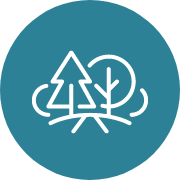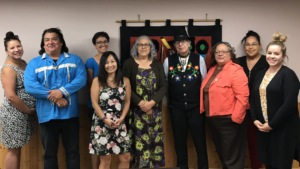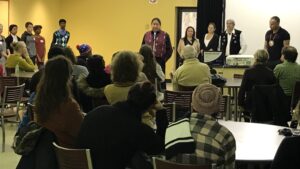WHAT IS IT?
Land-based education explicitly links experiential learning with Indigenous cultures and ways of knowing and being. While Indigenous pedagogy precedes and exceeds “experiential learning,” land-based educational opportunities integrate some Indigenous connections and teachings explicitly into curricular or co-curricular experiences that might also be understood as experiential. Land-based education takes a variety of forms but always involves an environmental approach to the relationship between people and the land and a recognition of the deep connection between Indigenous peoples and the land.
IMPORTANT CONSIDERATIONS
Eligibility:
- Eligibility criteria will vary depending on the initiative or course in which you are interested in participating.
Duration:
- Land-based education may be one-time experiences or longer-term placements with a flexible duration.
Recognition and / or compensation:
- Some land-based education experiences are course-based and will therefore offer course or program credit. Co-curricular opportunities may provide recognition through the Co-Curricular Record (CCR).
Accessibility:
- Inclusion in EL is achieved when an experience supports learning for all students. In keeping with the Ontario Human Rights Code, the University of Toronto has a commitment to an equitable learning environment for people with disabilities. It is important to engage in an interactive process to determine the optimal and most appropriate accommodations for individual students engaged in experiential learning.
- If a student requires an accommodation related to an land-based opportunity, you may wish to connect with one of the accessibility services offices at the University of Toronto. Staff at these offices will advise you on the disclosure of accommodation requirements as well as support you through the process of determining and negotiating effective accommodations for the student’s individual circumstances.
- Student support offices strive to create a safe and comfortable community where students have opportunities to discuss navigating barriers, find peer support and learn about various academic and social opportunities.
ADDITIONAL INFORMATION
- Review the Guidelines & Procedures page to further understand which partnership agreements, insurance and liability coverage and health and safety policies are applicable to land-based experiences. The Experiential Learning Risk Management Matrix provides a one-page overview.
- Students engaging in land-based education (for credit or an unpaid placement) receive workplace insurance coverage through the University or Ministry of Colleges and Universities.
BENEFITS
- Students will have the opportunity to take an environmental approach to their learning as they consider their relationship to the land and the deep connection between Indigenous peoples and the land.
- In land-based education, students have the opportunity to learn about Indigenous teachings.



